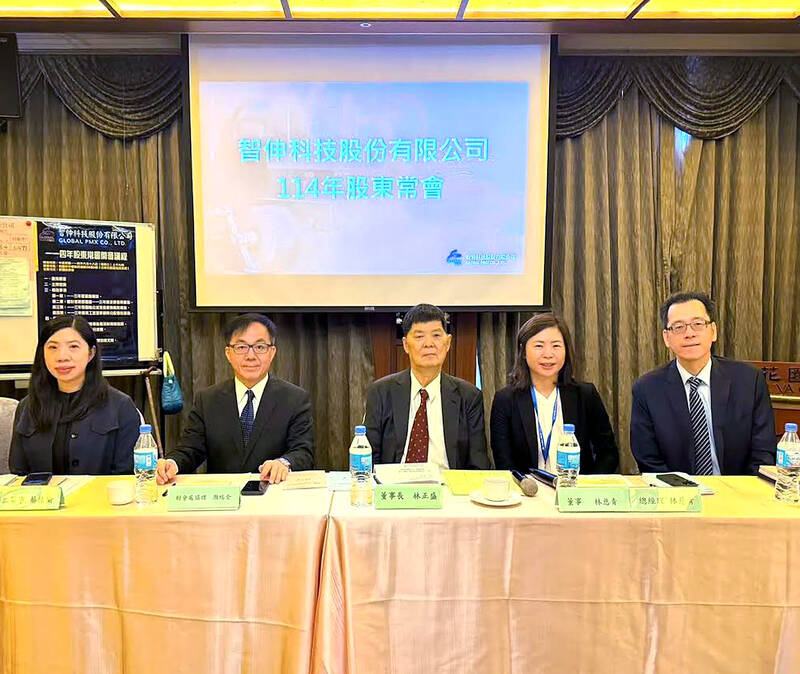Global PMX Co (智伸科) yesterday expressed confidence about its overall business operations this year, despite tariff uncertainties, saying it expects this year to be important in terms of transformation.
The Taoyuan-based provider of precision machinery processing services pledged in a statement to continue its diversification strategy for business development after receiving shareholders’ approval to distribute a cash dividend of NT$4.2 per share this year.
The dividend, about 68 percent higher than the NT$2.5 dividend the company paid the previous year, represented a payout ratio of 50.66 percent, said the company, whose products comprise mechanical parts for the automotive, electronics, sports and medical sectors.

Photo courtesy of Global PMX Co
At the company’s annual general meeting in Taoyuan’s Jhongli District (中壢), it said that net profit last year rose 85.29 percent year-on-year to NT$955.24 million (US$32.33 million), raising earnings per share to NT$8.29 from NT$4.47 a year earlier.
The company attributed the strong earnings to an annual revenue increase of 7.99 percent to NT$7.69 billion, as its major business units posted steady growth across the board, as well as continued improvement in product mix.
Established in 1987 as an automotive parts supplier, Global PMX has expanded production of non-automotive components over the past few years to drive sales growth and inject new momentum into its operations.
In the first quarter of this year, sales from automotive parts accounted for 56 percent of the company’s total sales, electronic components contributed 16 percent, while sports and medical items made up 11 percent each, company data showed.
Global PMX said it has accelerated the transformation of product structure in the automotive segment, and shifted focus to providing key components for electric vehicles, hydrogen-powered vehicles and hybrid vehicles — including air suspension systems and one-box brake systems — from those for conventional cars.
As for medical components, the company said customers’ purchase momentum has gradually recovered over the past few months and orders that were previously delayed due to raw material shortages have also been gradually restored.
The company said its shipments of key components required for the Da Vinci surgical system and smart medical robotic arms are expected to begin in the second half of this year.
It also reaffirmed its commitment to enhancing the electronics segment’s engagement with artificial intelligence (AI) technology as it looked to reassure shareholders about its business prospects.
The company said it has cut into the supply chain of key components for advanced process technology for global semiconductor equipment manufacturers, adding that it has started trial production this year.
Furthermore, the company said it has achieved technological breakthroughs in liquid cooling by developing key parts for Nvidia Corp chip-powered AI servers and started shipping products in the second quarter.
The company’s business update comes as the industry is facing continued uncertainties caused by the US’ tariff policy and the New Taiwan dollar’s rapid appreciation against the US dollar, resulting in its sales last month falling 7.67 percent year-on-year to NT$600.06 million. Cumulative sales in the first five months rose 12.89 percent to NT$3.26 billion.

The DBS Foundation yesterday announced the launch of two flagship programs, “Silver Motion” and “Happier Caregiver, Healthier Seniors,” in partnership with CCILU Ltd, Hondao Senior Citizens’ Welfare Foundation and the Garden of Hope Foundation to help Taiwan face the challenges of a rapidly aging population. The foundation said it would invest S$4.91 million (US$3.8 million) over three years to foster inclusion and resilience in an aging society. “Aging may bring challenges, but it also brings opportunities. With many Asian markets rapidly becoming super-aged, the DBS Foundation is working with a regional ecosystem of like-minded partners across the private, public and people sectors

BREAKTHROUGH TECH: Powertech expects its fan-out PLP system to become mainstream, saying it can offer three-times greater production throughput Chip packaging service provider Powertech Technology Inc (力成科技) plans to more than double its capital expenditures next year to more than NT$40 billion (US$1.31 billion) as demand for its new panel-level packaging (PLP) technology, primarily used in chips for artificial intelligence (AI) applications, has greatly exceeded what it can supply. A significant portion of the budget, about US$1 billion, would be earmarked for fan-out PLP technology, Powertech told investors yesterday. Its heavy investment in fan-out PLP technology over the past 10 years is expected to bear fruit in 2027 after the technology enters volume production, it said, adding that the tech would

Taiwan Semiconductor Manufacturing Co (TSMC, 台積電) has secured three construction permits for its plan to build a state-of-the-art A14 wafer fab in Taichung, and is likely to start construction soon, the Central Taiwan Science Park Bureau said yesterday. Speaking with CNA, Wang Chun-chieh (王俊傑), deputy director general of the science park bureau, said the world’s largest contract chipmaker has received three construction permits — one to build a fab to roll out sophisticated chips, another to build a central utility plant to provide water and electricity for the facility and the other to build three office buildings. With the three permits, TSMC

YEAR-END BOOST: The holiday shopping season in the US and Europe, combined with rising demand for AI applications, is expected to drive exports to a new high, the NDC said Taiwan’s business climate monitor improved last month, transitioning from steady growth for the first time in five months, as robust global demand for artificial intelligence (AI) products and new iPhone shipments boosted exports and corporate sales, the National Development Council (NDC) said yesterday. The council uses a five-color system to measure the nation’s economic state, with “green” indicating steady growth, “red” suggesting a boom and “blue” reflecting a recession. “Yellow-red” and “yellow-blue” suggest a transition to a stronger or weaker condition. The total score of the monitor’s composite index rose to 35 points from a revised 31 in August, ending a four-month